In today’s competitive data-driven business landscape, the role of human resources (HR) has evolved from traditional administrative functions to strategic decision-making that drives organizational success. At the heart of this transformation lies the concept of data integration-a dynamic process that seamlessly integrates HR-related information from various sources into a unified system. This integration of data, including everything from employee records and performance metrics to benefits administration and compliance tracking, has revolutionized the way HR professionals operate. By partnering with a professional provider of data processing services, HR departments can build updated data sets, which are crucial for effective data management.
What is Data Integration in HR?
Data integration in the HR department refers to the process of consolidating and synchronizing HR-related information from various sources and systems into a unified and coherent structure. Such integration can create a comprehensive and accurate database that encompasses all aspects of an organization’s workforce, including everything from employee profiles and performance evaluations to payroll records and benefits administration. By implementing data integration in the HR department, organizations can achieve a holistic view of their workforce, leading to more effective decision-making, streamlined processes, and improved employee experiences.
Let’s take a closer look at the benefits in detail.
Improved Decision-Making – Data integration allows HR professionals to access comprehensive and accurate information such as payroll, employee records, performance evaluations and more from various sources. This consolidated data provides insights that facilitate informed decision-making.
Enhanced Efficiency – Integrating HR data eliminates the need for manual data entry and reduces the risk of errors. This leads to increased efficiency in HR processes.
Real-Time Reporting and Analytics – Data integration enables HR teams to generate real-time reports and conduct in-depth analytics.
Streamlined Compliance – Compliance with various labor laws, regulations, and industry standards is critical for any HR department. Data integration ensure consistent data across different compliance-related activities, such as tracking employee hours, managing leave, and adhering to diversity and inclusion initiatives.
Enhanced Employee Experience – With integrated data, HR departments can provide a seamless and personalized experience to employees. This includes self-service portals for accessing personal information, benefits enrolment, and tracking career development progress.
Support for Talent Management – Data integration aids in creating comprehensive talent profiles for each employee. HR can track performance metrics, training and development progress, and more.
Incorporating data integration in HR processes may involve utilizing advanced HR management systems (HRMS), human capital management (HCM) software, or enterprise resource planning (ERP) platforms. It is extremely important to ensure that data integration is done securely and in compliance with data privacy regulations to protect sensitive employee information. If your HR department handles a significant amount of data, partnering with a professional business process outsourcing company can prove beneficial. Experts can provide reliable, scalable data processing solutions to streamline your operations to boost efficiency and accuracy.
MOS provides business process outsourcing solutions for a wide range of industries.





